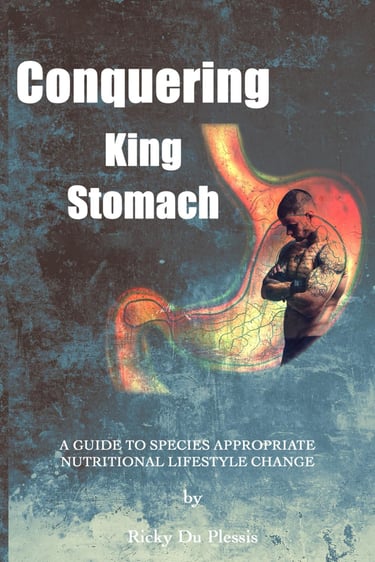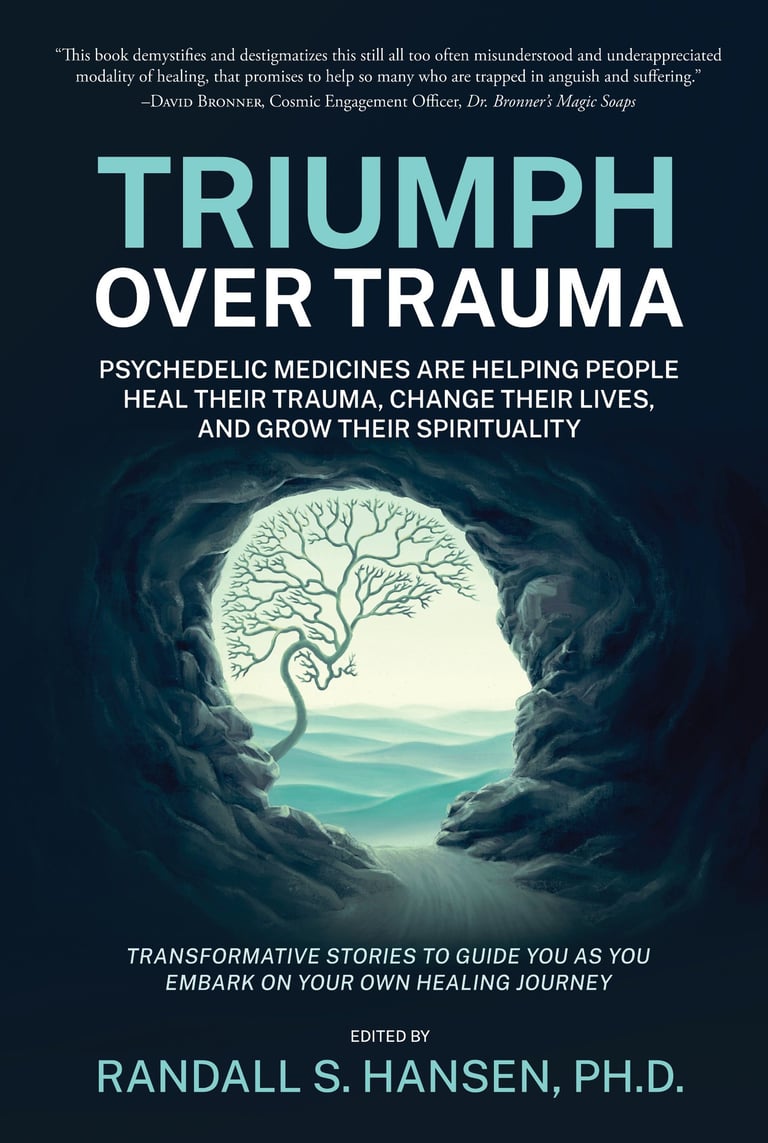Empowering Reading: Conquering King Stomach Book Review
Conquering King Stomach: A Guide to Species Appropriate Nutritional Lifestyle Change, by Ricky Du Plessis (2025). ISBN: 979-8311756839.
In the end, so many of us are searching for the ideal diet, the ideal lifestyle… one that will help us recover our health and vitality while extending our healthspan.
Are you serving your “King Stomach” with a diet of sugary beverages and ultra-processed foods, or are you focused on your health and a long healthspan? Many of us appear to be abusing our stomachs (and the rest of our bodies) because we have been led astray by poor nutrition advice and the unfortunate manipulation of our foods by Big Food.
We are hurting with excess weight, insulin resistance, and poor metabolic health. And this is exactly what inspired Rocky Du Plessis to write this well-researched book. During his time working on his master’s degree, while also balancing work and family, his diet became one filled with convenience foods – and he saw his health deteriorating from it. This book is the result of his desire to get back to good health and to share this information with the rest of the world.
Conquering King Stomach is a strong book with loads of good information divided into four parts: defining the problem, understanding the why, getting back to species-appropriate nutrition, and his 7-step process for nutritional lifestyle change.
The book’s premise: Western society struggles with widespread malnutrition and obesity, which are caused by the overconsumption of highly processed foods that are nutrient-deficient and high in simple carbohydrates, both of which have led to the onset of almost all chronic illnesses.
The author explains that our universal diet of ultra-processed convenience foods leads to overeating. Through processing and manipulation (to achieve the “Bliss Point”), food marketers have been manufacturing hyperpalatable “foods” for decades now, making them nutrient-empty but unavoidable (because they constitute about 80 percent of the typical grocery store, as well as most fast foods and takeout), as well as cheap and addictive.
He shares a powerful quote from British health crusader Barry Groves that I recommend reading several times. “Civilized man is the only animal clever enough to manufacture his own food, and the only animal stupid enough to eat it.”
I love his recommendations for focusing on metabolic health, prioritizing home cooking, eliminating the use of refined sugars (and refined carbs), and emphasizing the need to reduce or eliminate all ultra-processed convenience foods. (Learn more about metabolic health here.)
He also does a great job demonstrating how the old “Lipid Hypothesis,” which suggests that cholesterol (specifically LDL) has a causal role in the development of cardiovascular disease, is outdated through the research in metabolic health, which clearly draws a line not from animal-based foods with cholesterol but to insulin resistance (from consuming high levels of refined sugars and refined carbs). (Learn more in my article.)
Like many others in the health arena, the author places the blame of the rise of mental disorders and illnesses directly on our diet, and while I completely believe that our diets are a driver of mental health issues, it is not the sole factor. As I have discussed in many of my articles, I believe there are two causes of our mental health crisis. The major driver is our already poor mental health, driven by unresolved past trauma wounds that make us feel unworthy and/or seeking comfort with the crappy foods available from our broken food system. The poor food choices then make our mental (and physical) health that much worse. A third driver is our sedentary lifestyle, because physical activity provides powerful mental health benefits.
I love and respect so many aspects of this book, but its conclusion is a bit too extreme for me to support – that we are all meant to live a mostly carnivore-based diet.
Based on my research, we evolved from being mostly hunters and gatherers, people who were opportunistic and took advantage of whatever food they could find. Meat and fish eaters for sure, but also consumers of wild plants and fruits. Yes, there were tribes of people who ate only meat and fish (such as the Intuit), but also tribes (such as the Nilgiris) whose diet consisted of only plants.
Furthermore, it is my firm belief that while we mostly descended from omnivorous ancestors, we must now find a diet of healthy foods that works best for us, wherever we land on the spectrum of plant-to-animal food choices.
Do we need healthy fats and proteins? Yes! These should be our top priority; most of mine are animal-based fats and proteins. Do we need vegetables and fruits? I still believe we need healthy fiber, but I am awaiting more research on our gut microbiome and the current hypothesis that our guts need quality sources of fiber. Is it true that some vegetables have so-called defense mechanisms that can negatively affect our health? Yes, but many people have no such sensitivities, and for these people, vegetables can be a great source of nutrients.
The author concludes the book with his 7-Step Process for Nutritional Lifestyle Change:
Step One: Assess and establish your baseline
Step Two: Shift your focus to home cooking
Step Three: Eliminate ultra-processed foods
Step Four: Prioritize whole animal foods
Step Five: Optimize your inclusion of plants
Step Six: Adjust to low-carb living
Step Seven: Sustain and refine your new hypercarnivore lifestyle
In conclusion, this book is a great resource for understanding why we are both confused about health and nutrition as well as how and why we have such a huge health crisis.
The author and I agree completely on the causes of this crisis, but we split hairs on the methods for fixing the crisis. Our food system is horribly broken, and our lifestyles too sedentary, but it is my belief that every person has to find the right mix of foods that work well for their bodies, guts, and brains. For some, it is vegan or carnivore, but for the majority of us, it is somewhere in between.
Find more book reviews and advice for living a happy, healthy, and healing life here.
Dr. Randall Hansen is an evangelist, educator, and thought-leader... helping the world heal from past trauma and the poor food system. He is founder and CEO of EmpoweringSites.com, a network of empowering and transformative Websites, including EmpoweringAdvice.com.
He is the author of the groundbreaking Triumph Over Trauma: Psychedelic Medicines are Helping People Heal Their Trauma, Change Their Lives, and Grow Their Spirituality and the well-received HEAL! Wholeistic Practices to Help Clear Your Trauma, Heal Yourself, and Live Your Best Life.
The third book in the Wholeistic Healing Trilogy is the game-changing The HEALing Revolution Diet: A Science-based Approach to Heal Your Gut, Reverse Chronic Illnesses, Lose Weight, Clear Your Mind, and Increase Longevity.
Dr. Hansen's focus and advocacy center around true health and healing journeys that results in being able to live an authentic life filled with peace, joy, love. Learn more by visiting his personal Website, RandallSHansen.com. You can also check out Dr. Randall Hansen on LinkedIn.








